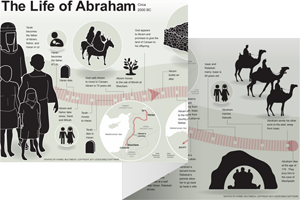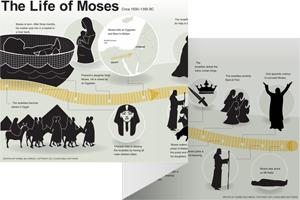105:1–45 This praise psalm recounts Yahweh’s work on behalf of Israel from a very positive standpoint—in this regard, it could be classified as a historical psalm. After an introductory note of praise (vv. 1–6), the psalmist follows the events from the Pentateuch, beginning with Yahweh’s covenant with Abraham (vv. 7–15). He describes how Israel came to Egypt and grew in number (vv. 16–25), and emphasizes Yahweh’s miraculous signs as he describes the exodus (vv. 26–38). He shows how Yahweh protected the Israelites during the wilderness years (vv. 39–42), and concludes with Israel’s entry into the promised land (vv. 43–44). |
 Types of Psalms Table
Types of Psalms Table
105:1–6 The psalmist begins by calling the audience to proclaim Yahweh’s wondrous deeds so that both Israel and the surrounding peoples will recall them. He mentions Israel’s special status as Yahweh’s chosen people, and specifically names the patriarchs Abraham and Jacob (see Gen 12:1–3; 32:28) in anticipation of the historical summary that will follow. |
105:1 Give thanks Refers to glad remembrance of Yahweh’s actions.
105:2 tell of all his wonderful works Focuses on Yahweh’s excellence and moral goodness displayed in His actions.
105:5 his signs The Hebrew word used here, mopheth (which can be rendered as “wonder” or “sign”), is used in connection with Moses’ signs (Exod 4:21; 11:10).
105:6 O offspring of Abraham Refers to the original patriarch of Israel with whom God made a covenant. By identifying Israel as Abraham’s offspring, the psalmist anticipates the discussion of the Abrahamic covenant in Ps 105:8–10 (compare Gen 17).
By identifying Israel as Abraham’s offspring, the psalmist anticipates the discussion of the Abrahamic covenant in Ps 105:8–10 (compare Gen 17).
descendants of Jacob Refers to the people of Israel, emphasizing their heritage as descendants of a special series of promises begun with Abraham.
chosen ones The Hebrew word used here, bachir, can refer to one who is chosen or pious.
105:7–11 The psalmist continues to rehearse Israel’s sacred history by mentioning the patriarchs as well as Yahweh’s covenant with Israel. He mentions all three patriarchs, as well as the anticipation of future possession of the land of Canaan. This section corresponds to Gen 12–36. |
105:7 his judgments A judgment or decision in a legal dispute. See Ps 94:15 and note.
are in all the earth Emphasizes the extent of God’s authority: No place on earth is beyond His claim.
105:8 his covenant Refers to the set of stipulations that governs the relationship between Yahweh and Israel. The ot describes four main biblical covenants, including Yahweh’s covenant with Noah (Gen 9), Abraham (Gen 15; 17), Moses and the people at Sinai (Exod 19–34) and Moab (Deut 29–30), and David (2 Sam 7). The prophet Jeremiah explicitly mentions a “new covenant” (Jer 31:31–34; compare 32:36–41). Hosea 6:7 may also imply a covenant with Adam.
explicitly mentions a “new covenant” (Jer 31:31–34; compare 32:36–41). Hosea 6:7 may also imply a covenant with Adam.
105:9 Abraham Yahweh interacted with Abraham in a series of promises and agreements culminating in a covenant (Gen 12:1–7; 13:14–17; 15:1–21; 17:1–27; 22:15–18). See note on Ps 105:6.
Isaac The son of Abraham and Israel’s second patriarch. Yahweh extended the promises and covenant with Abraham to Isaac in Gen 26:1–5.
105:10 He then confirmed Yahweh extended the promises and covenant that he made with Abraham and Isaac to Jacob in Gen 28:13–15 and Gen 35:9–12. Isaac’s blessing to Jacob also mentioned elements of these promises (see Gen 27:27–29).
to Israel When used in this way, the name Israel naturally extends from the person Jacob (renamed Israel) to the entire people of Israel who are descended from Jacob. See Ps 105:6 and note.
as an everlasting covenant The Hebrew phrase used here, berith olam, is used with reference to Abraham in Gen 17:1–27. The expression is first used in Gen 9:16 to describe Yahweh’s covenant with humankind after the flood. See Ps 105:9 and note.
105:11 the land of Canaan The original object of Yahweh’s promises to Abraham (see v. 6 and note). It may relate to the land reference in v. 44.
of Yahweh’s promises to Abraham (see v. 6 and note). It may relate to the land reference in v. 44.
inheritance The word nachalah is often used in reference to the promised land.
105:12–15 In this interlude, the psalmist reflects on the period when the patriarchs were wandering in the land of Canaan (and the surrounding region). His description of the events is very general; he may be drawing from the three episodes where a patriarch’s wife was in danger of being violated by a foreign ruler (see Gen 12:10–20; 20:1–18; 26:6–11). |
105:12 sojourners The Hebrew word ger used here describes a resident alien.
105:13 they wandered The verb halakh in this context has the sense of walking back and forth.
105:15 my anointed ones The act of anointing included smearing an object or person with liquid (such as oil or dye), and thereby set them apart as special.
my prophets Refers specifically to Abraham (see Gen 20:7). In the ot the Hebrew term used here, navi, typically refers to someone who hears from Yahweh by means of special communication or visions and then speaks on Yahweh’s behalf. Here the psalmist appears to be using it in a general sense to reflect the wording of Gen 20:7.
105:16–22 The psalmist recounts the story of Joseph’s imprisonment and rise to power in Egypt (Gen 37; 39–41). |
105:16 a famine Predicted in Gen 41 (compare Gen 41:54).
105:17 Joseph The son of Jacob who was sold into slavery by his envious brothers (see Gen 37:26–28). Although he was a pivotal figure in Israel’s history, he is not usually described as a patriarch of Israel.
105:18 fetters Joseph’s angry master Potiphar put him in prison (see Gen 39:1–20, Gen 39:21–40:23; 41:9–14).
105:19 tested The Hebrew word used here, tsaraph—which generally refers to smelting or refining metals—might have the sense of proving or demonstrating value.
105:20 he freed him See Gen 41:14–45.
105:23–36 The psalmist recounts the story of Israel’s enslavement in Egypt and their deliverance through Moses. He mentions eight out of the 10 plagues against Egypt, culminating in the first Passover and the death of the firstborn of Egypt (Exod 1–12). |
105:23 came to Egypt Corresponds to Gen 46:3–7.
Ham One of Noah’s sons who helped repopulate the world following the great flood (Gen 6–9; see Ps 10:1, 6–14).
105:24 he made his people very fruitful Corresponds to Exod 1:7, where Egypt became fearful of the numerous people of Israel and enslaved them.
their enemies This is a retrospective evaluation. Before Egypt had enslaved Israel, they were not enemies (see Gen 47:5–6; Exod 1:8).
105:25 He turned their heart Yahweh’s work against the nation of Egypt is a prominent theme of the exodus story. The psalmist views Egypt as a collective unit. However, in the book of Exodus, Pharaoh is the emblem of Egypt; God’s action of hardening Pharaoh’s heart is similar to Psa 105:25 (see Exod 9:12; 10:20, 10:27; 11:10).
105:26 Moses Moses and his brother Aaron played pivotal roles in Israel’s rescue from enslavement in Egypt. See Ps 90:title and note.
his servant See Deut 34:5.
105:27 his signs Refers to the plagues against Egypt in the book of Exodus. See Exod 4:1–9; 7:8–12.
.
105:28 darkness The ninth of the 10 plagues against Egypt (see Exod 10:21–29). The psalmist may present the ninth plague first to provide a bookend for God’s mighty deeds against Egypt; he presents the 10th plague last (see Ps 105:36).
105:29 waters into blood The first plague (see Exod 7:14–25).
105:30 with frogs The second plague (see Exod 8:1–15).
105:31 flies The fourth plague (see Exod 8:20–32).
gnats The third plague (see Exod 8:16–19).
105:32 hail The seventh plague (see Exod 9:13–25). The psalmist does not list plagues five and six (dead livestock and boils).
105:33 he struck The psalmist elaborates on the disaster brought on by the plague of hail.
105:34 locusts The eighth plague (see Exod 10:1–20).
(see Exod 10:1–20).
105:36 the firstborn The tenth plague against Egypt, which coincides with the first Passover (Exod 11:1–10; 12:29–32.
the first The Hebrew word used here, reshith, is associated with the first products of harvest and the first offspring of animals and people. Israelites associated firstfruits with the choicest and best of something, and therefore considered them to have special value.
105:37–42 The psalmist briefly recounts the time of Israel’s journey in the wilderness (Exod 12–Num 36). He presents the events in a positive light and doesn’t mention Israel’s rebellion. |
105:37 with silver and gold See Exod 12:35–36.
who stumbled Implies that no one fell and stayed down.
105:38 the fear of Refers to a debilitating fear.
105:39 a cloud Indicated Yahweh’s presence with Israel (see Exod 13:21–22).
105:40 quail Yahweh’s provision of the quail during the wilderness journey eventually developed into an example of Israel’s failure (see Exod 16:13; Num 11:31–34).
the bread of heaven Refers to manna (see Exod 16:1–35).
(see Exod 16:1–35).
105:41 He opened the rock May refer to Exod 17:1–7 or Num 20:2–13. The psalmist doesn’t mention Moses’ failure in Num 20.
105:42 his holy promise Refers to the covenantal promises made to Abraham. See Ps 103:18 and note; and v. 6 and note; v. 9 and note.
105:43–45 The psalmist concludes by summarizing the exodus from Egypt to the entry into the promised land. He asserts that Yahweh brought Israel out of Egypt and into Canaan so that they would obey Him and His commands. |
105:43 with joy This may be an echo of the joyful songs of Moses and Miriam (see Exod 15:1–18, 21).
105:44 the lands of the nations Probably refers to the land Yahweh promised to Abraham, Canaan (see Ps 105:11 and note).
the labor of the peoples Probably refers to the cities and wealth of the Canaanites.
105:45 they might observe his statutes The psalmist clarifies that Yahweh delivered Israel and brought them into the promised land so that they might obey Him.
Praise Yah This closing statement is repeated at the beginning and end of Psa 106 (106:1, 48), and seems to form a connection with that psalm. See 104:35 and note.

|
About Faithlife Study BibleFaithlife Study Bible (FSB) is your guide to the ancient world of the Old and New Testaments, with study notes and articles that draw from a wide range of academic research. FSB helps you learn how to think about interpretation methods and issues so that you can gain a deeper understanding of the text. |
| Copyright |
Copyright 2012 Logos Bible Software. |
| Support Info | fsb |
 Loading…
Loading…


